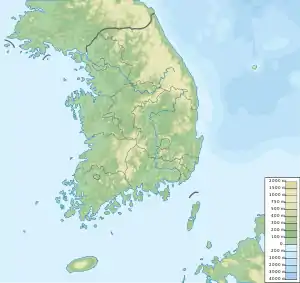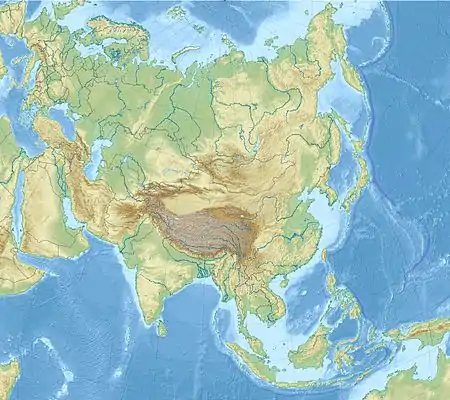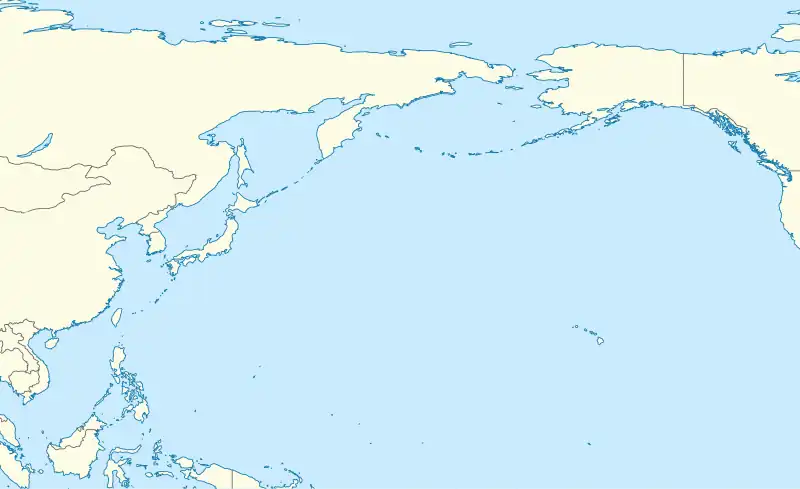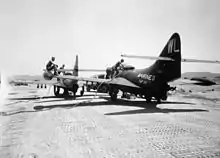Pohang Gyeongju Airport 포항경주공항 浦項慶州空港 Pohang Gyeongju Gonghang P'ohang Kyeongju Konghang | |||||||||||
|---|---|---|---|---|---|---|---|---|---|---|---|
 | |||||||||||
| Summary | |||||||||||
| Airport type | Public / Military | ||||||||||
| Owner | Ministry Land, Infrastructure and Transport | ||||||||||
| Operator | |||||||||||
| Serves | Pohang, Gyeongju | ||||||||||
| Location | Pohang, North Gyeongsang Province, South Korea | ||||||||||
| Opened | February 1970 | ||||||||||
| Elevation AMSL | 75 ft / 23 m | ||||||||||
| Coordinates | 35°59′16″N 129°25′13″E / 35.98778°N 129.42028°E | ||||||||||
| Website | www | ||||||||||
| Map | |||||||||||
 KPO  KPO  KPO .svg.png.webp) KPO | |||||||||||
| Runways | |||||||||||
| |||||||||||
| Statistics (2019) | |||||||||||
| |||||||||||
Source:KAC[1] | |||||||||||
Pohang Gyeongju Airport is an airport in Pohang, South Korea (IATA: KPO, ICAO: RKTH). In 2011, 255,227 passengers used the airport.[1]
History
Pohang Airfield was originally developed during the Japanese Imperial period.
Military
Pre-Korean war
In early July 1950 Pohang airfield was identified as a potential base for USAF operations. On 7 July, Brigadier-General Timberlake deputy-commander of the Fifth Air Force ordered the development of the base. Company A 802nd Engineer Aviation Battalion landed at Pohang and began improving the airfield on 12 July by added a 500 feet (150 m) PSP extension and building hardstands for 27 F-51 Mustangs.[2] The airfield was designated by the USAF as K-3.
Troops of the Korean People's Army (KPA) 12th Division infiltrated the Pohang area in early August and made guerilla attacks against the airfield. By 12 August KPA troops entered Pohang and so on 13 August the 35th Fighter-Interceptor Group evacuated to Tsuiki Air Field in Japan. ROK and U.S. forces routed the KPA several days later, but the continued presence of guerilla units mitigated against an early return to the base.[2]: 124
USAF units based there from July–August 1950 included:
- 35th Fighter-Interceptor Group from 14 July-13 August 1950[2]: 112 subordinate units included:
- 39th Fighter-Interceptor Squadron operating F-51s from 8–13 August 1950[2]: 112
- 40th Fighter-Interceptor Squadron operating F-51s from 16 July-13 August 1950[2]: 95
- 6131st Air Base Squadron (later 6131st Tactical Support Wing) from 14 July 1950[2]: 95
The 802nd Battalion returned to Pohang on 27 September finding the airfield relatively undamaged. The 35th Fighter-Interceptor Group returned to Pohang on 3 October. On 12 October No. 77 Squadron RAAF operating F-51s arrived at Pohang.[2]: 178
In July 1953 the United States Navy deployed two AJ (A-2) Savage aircraft to K-3 as a nuclear deterrent in the final days of the Korean War.[3]
Post-Korean War
In October 2008 the United States Navy relocated a permanent detachment of MH-53E Sea Dragons assigned to HM-14 from Iwakuni, Japan. This detachment provides Seventh Fleet with a forward-deployed AMCM and heavy-lift asset. Because Pohang Gyeongju Airport is sharing with military, taking photograph or video of apron, runway and military facility is strictly prohibited.
Civil operation
in the 1970, Pohang Airfield developed capacity for civil operations. [4] Civil operations begain in 1986 with a route from Seoul route operated by Korean Air. [4]
In the 1990s, Asiana Airlines started flights to Pohang Airport, its passenger terminal was expanded, and a new terminal was opened in June 2002. [4] On 15 March 1999, Pohang Airport was the destination of Korean Air Flight 1533, a McDonnell Douglas MD-83 which was flying from Seoul to Pohang. The flight overshot the runway during landing at Pohang Airport. All 156 people on board survived, but the aircraft was destroyed. The accident was the 11th hull loss of a McDonnell Douglas MD-80. [1]
In January 2014, Pohang Airport was closed due to its runway having to be repaved [5]. This was completed in May 2016. [6]
In 2020, Pohang and Gyeongju cities submitted a proposal to change the name of the airport from Pohang Airport to Pohang Gyeongju Airport to Ministry of Land, Infrastructure and Transport. [7] In 2022, government approval for the request was granted and the airport received its current name, Pohang Gyeongju Airport.[8]
Airlines and destinations
| Airlines | Destinations |
|---|---|
| Jin Air | Jeju,[9] Seoul–Gimpo[9] |
Statistics
| Air traffic statistics | |||
|---|---|---|---|
| Aircraft operations | Passenger volume | Cargo tonnage | |
| 2001 | 8,345 | 774,029 | 1,964 |
| 2002 | 8,128 | 704,467 | 1,582 |
| 2003 | 7,608 | 645,494 | 2,086 |
| 2004 | 7,285 | 659,988 | 2,410 |
| 2005 | 4,968 | 464,653 | 1,677 |
| 2006 | 3,591 | 347,180 | 1,208 |
| 2007 | 2,831 | 297,702 | 980 |
| 2008 | 2,998 | 267,686 | 805 |
| 2009 | 3,746 | 304,372 | 865 |
| 2010 | 3,598 | 323,652 | 959 |
| 2011 | 3,542 | 260,050 | 860 |
| 2012 | 3,312 | 262,198 | 886 |
| 2013 | 3,131 | 239,516 | 909 |
| 2014 | 1,540 | 112,387 | 441 |
| 2015 | 0 | 0 | 0 |
| 2016 | 916 | 68,226 | 216 |
| 2017 | 1,373 | 98,391 | 323 |
| 2018 | 1,358 | 83,818 | 332 |
| 2019 | 1,162 | 93,769 | 395 |
| 2020 | 838 | 65,994 | 295 |
| 2021 | 1,868 | 158,927 | 697 |
| 2022 | 2,514 | 249,413 | 1,084 |
| Source: Korea Airports Corporation Traffic Statistics[10] | |||
Access
Bus
- No. 200 : Yangdeok ↔ Lotte Department Store ↔ Jukdo Market ↔ POSCO ↔ Pohang Gyeongju Airport ↔ Guryongpo
References
- 1 2 3 "South Korea Traffic Statistics". KAC.
- 1 2 3 4 5 6 7 Futrell, Frank (1983). The United States Air Force in Korea, 1950-1953 (PDF). Air Force History & Museums Program. p. 95. ISBN 9780912799711.
 This article incorporates text from this source, which is in the public domain.
This article incorporates text from this source, which is in the public domain. - ↑ Miller, Jerry. Nuclear Weapons and Aircraft Carriers: How the Bomb Saved Naval Aviation. Washington, D.C.: Smithsonian Institution Press, 2001. ISBN 1-56098-944-0.
- 1 2 3 "Airport overview". Pohang Gyeonjju Airport.
- ↑ "포항공항 활주로 포장공사로 7월부터 폐쇄" [Pohang Airport closed from July for runway packaging]. Sisa Focus News.
- ↑ "포항공항 2년 만에 재개장" [Pohang Airport reopens after 2 years]. Seoul News.
- ↑ "포항시·경주시, 포항공항 명칭변경 건의...포항·경주공항으로" [Pohang·Gyeongju, request the changing name of Pohang Aiport...to Pohang Gyeongju Airport]. Ajou Economy.
- ↑ "포항공항, '포항경주공항'으로 명칭 변경" [Pohang Airport, change its name to Pohang Gyeongju Airport]. Financial News.
- 1 2 "포항~김포, 포항~제주 노선 진에어 31일 취항" [Pohang-Gimpo, Pohang-Jeju route Jin Air launched on the 31st]. Yonhap News Agency (in Korean). 16 July 2020.
- ↑ "Air Traffic Statistics". Incheon International Airport. Archived from the original on 2020-01-14. Retrieved 23 July 2023.
![]() This article incorporates public domain material from the United States Air Force
This article incorporates public domain material from the United States Air Force
